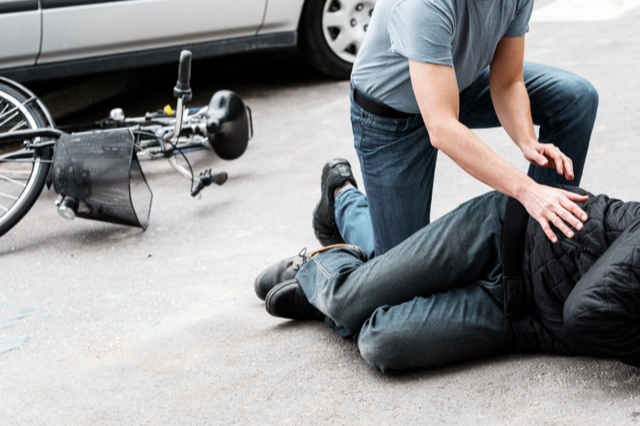It is almost impossible to avoid pedestrian injuries in an automobile accident. Due to the bulk and strength of motor vehicles, pedestrian accidents can result in severe injuries. The severity of the injury due to an accident depends on multiple factors, including the angle of impact, speed of the car, etc.
Upon filing a personal injury suit or a claim with an insurance company, the first two questions that come to the victim's mind are, “How long will it take to get compensation?” and “How much can I expect to receive?” While these questions remain the same for pedestrians who have been injured after being hit by a vehicle, there are multiple aspects to consider.
The first problem is that it's nearly impossible to figure out the "average" compensation amount. Each case differs from another and there are a variety of factors that can influence the compensation amount. Furthermore, accident liability is not always as obvious. Occasionally, a pedestrian may be held partially or entirely responsible for an accident.
In this article, we address what impacts a pedestrian accident settlement in Florida and other information you should be aware of if you're ever injured in a pedestrian accident.
Factors that Affect a Florida Pedestrian Accident
Every case is unique and the time it takes to settle varies. It can range from several months to several years. In terms of duration and amount, these may influence the settlement process:
The Severity Of Your Injuries
Generally, the settlement is not reached until the necessary medical treatments have been completed. Thus, the case will not be closed until the victim has completely recovered without any chance of improvement in the future. Most pedestrians recover quickly from minor injuries. Cases involving serious pedestrian injuries, on the other hand, may take a longer time to settle.
Negotiating With Insurers
Negotiations with the insurers involved begin after the treatment is over. These negotiations can also take some time. It may take several months to negotiate a settlement, even when both parties agree to the amount. A victim who asks for more than the insurance company is willing to pay will delay the settlement process until both parties agree on the settlement amount.
Occasionally, neither the driver nor the pedestrian has insurance. Taking the case to court is the only option in such a situation. Occasionally, if the driver at fault does not have enough assets, the victim is less likely to obtain a sizable injury settlement.
The Trial
Not every pedestrian accident case ends up in court, but some do. If a settlement attempt outside the courtroom fails, a case may have to go to trial. Normally, this type of settlement takes longer than out-of-court settlements.
The Most Common Causes of Florida Pedestrian Accidents?
In Florida, pedestrian accidents are primarily caused by motorists' negligence, although pedestrians can cause or contribute to an accident. The most common causes of Florida pedestrian accidents include:
- Distracted driving,
- Impaired driving,
- Speeding,
- Failure to slow down,
- Failure to stop,
- Aggressive driving, and
- Failing to obey traffic signals.
Other factors may contribute to motorists hitting pedestrians, such as poor visibility or obstructions. Often, a third party is responsible for an accident or injury.
What Should You Do If You are Hit by a Vehicle?
If you are hit by a vehicle, you should follow these steps immediately. The following will protect you and your legal rights.
Seek Medical Assistance Immediately
When a person has been hit by a vehicle and is unconscious, this responsibility falls on the driver or any witnesses (if any). The responsibility, however, rests with you if you are conscious after being struck. You may be unable to recognize pain or injury following an accident because of the physical and emotional shock your body will probably be experiencing. It is strongly recommended that you seek immediate medical attention and call 911, even if you feel fine.
Document Your Injuries
As soon as you contact medical services, make an assessment of your person.
- What part of your body is in pain?
- Do you have any visual injuries?
- Have any of your clothes been torn? In that case, torn clothing may indicate an injury to the body, but the area may not be in pain at the moment.
- Try feeling your face, your head, and your limbs. Do you feel any blood? Due to shock, you may be bleeding, but your body is unable to process the pain associated with that bleeding.
Be sure to note all injuries and pain. Inform the paramedics as soon as they arrive,
Call the Police
An accident should be documented by noting down the events leading up to it. In any case, it is unlikely that you will be able to recall this information emotionally or physically. It is possible that you don't have a pen or paper to record the chain of events.
A police report documenting the accident may be required by your insurance company or attorney, but this is also the perfect opportunity to summarize what happened before being hit. Memory loss can occur due to injury or simply forgetting specific details. It is extremely important that you document all the steps that led to you being hit with a police officer as soon as possible.
Do Not Discuss Fault on the Scene
No matter whether you or the motorist is to blame for the events leading up to your being struck by a vehicle, you are likely unaware of the law regarding pedestrian accidents. Should legal action be filed after the accident, any statements you make on the scene or to the motorist's insurer could be used against you. Discuss the accident only with your attorney, medical personnel, and your insurance company. Only these two entities are looking out for your best legal interests.
The insurance company for the motorist does not act in your best interest, so you should not speak with them extensively. You should not sign any documents they may send you or accept any settlement offers they may make. Request the company's name, address, phone number, and claim number. Offer the insurer only the contact information of yourself, your attorney, and your insurance company (if applicable).
Contact Your Insurance Company
Contact your car insurance company immediately if you have one. Although you were a pedestrian when the accident happened, most auto insurance policies cover this type of accident. If you intend to make a medical or disability claim after the accident, you'll need to do this.
Seek Professional Legal Representation
In most cases, pedestrians struck by cars will suffer more serious injuries than occupants in the vehicle. You may experience physical, emotional, and financial difficulties due to your injuries. Most likely, the driver's insurance company will deny any claims you file by placing the blame on you. In the event that they do offer you a settlement, you can expect it to be grossly undervalued and do not take into account any difficulties you may face in the future. You will be able to protect your legal rights and livelihood by acquiring a qualified personal injury attorney.
Insurance Adjusters and Settlements
An injured pedestrian will almost certainly have to file a claim with an insurance company to get compensation for their losses. Understanding how an insurance adjuster works is helpful to determining a settlement amount.
An insurance adjuster may take your quantifiable losses like medical bills, lost income, and other dollar amounts that are all considered "special damages" and multiply that amount by one-and-a-half to four to arrive at your "general damages," which includes pain and suffering and the emotional impact of injury. The multiplier, the second number, will depend on your injury severity, your medical treatment, and the length of time it takes for you to recover. Consequently, an adjuster may use a multiplier closer to four or five for severe injuries with extensive medical treatment and a prolonged recovery period.
A daily rate may also be used to determine the settlement for your pain. A settlement is then arrived at by combining the special damages and general damages. Negotiations usually ensue, where both sides of the case, usually through their insurers or attorneys, present arguments and evidence to raise or lower the number.
What Rights and Duties do Pedestrians in Florida Have?
Any pedestrian who walks near a road or vehicle has the right to basic safety. Pedestrians walking along the sidewalk shouldn't worry about distracted drivers swerving, jumping the curb, and hitting them with their cars. You have the right not to be harmed if you observe Florida traffic and pedestrian laws and act reasonably.
Additionally, pedestrians have an obligation to take reasonable precautions to avoid being struck by a car. In the case of someone failing to obey laws and getting hit as a result, they can contribute to any injuries and accidents that arise.
Despite this, even if you were partially at fault for being hit, you still have rights. A personal injury lawyer can explain your rights and help you seek justice. Contact 1-888-DOCS-4PI if you find yourself in a pedestrian accident in Florida. Our team of medical professionals are ready to help you get on the road to recovery. If you need legal assistance, we are also able to refer you to the best personal injury lawyers in the region.





